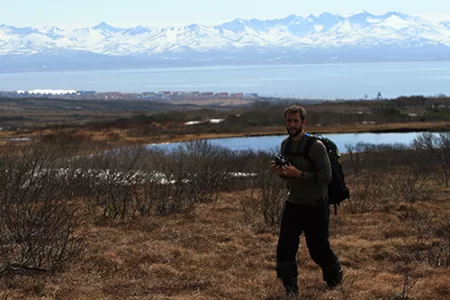Name: Drew Gerkey
Institution: SESYNC
Hometown: Stillwater, MN
Field of Study: Anthropology
What inspired you to choose this field of study?
I was an English Literature and Anthropology major in college. I decided to continue studying Anthropology in graduate school for two reasons. First, I found it exciting and challenging to document and understand cultural variation, to learn about different ways of understanding and being in the world. Before entering graduate school, I hadn’t traveled much abroad, so this had mostly been an intellectual exercise. I was excited to have a chance to experience some of these challenges firsthand and try to apply scholarly work on the ground. The opportunity to travel to amazing and interesting places and meet new people is definitely a perk of being an anthropologist, so I suppose that’s a second reason I chose to continue studying Anthropology. I love books and I love libraries, but it’s fun to be out there interacting with new people and places.
What is your favorite thing about being a scientist or researcher?
I’m always thankful for the way my job as a researcher allows me the flexibility and resources to pursue questions and ideas that I find exciting, perplexing, and important. I love learning and teaching, so to have a job that lets me make a living doing both is great.
What is the most important characteristic a scientist must demonstrate in order to be an effective scientist?
It’s hard to identify a single characteristic, but I think passion is probably the key to being a successful researcher. From what I’ve seen, the best scholars are passionate about the work they do. Whether it’s the ideas they explore or the issues they address that drive them most, you need to be passionate about your work in order to slog through the challenges you encounter along the way.
What about your field or being a scientist do you think would surprise people the most?
Anthropologists travel quite a bit and spend long periods of time away from home. People often assume that’s one of the hardest parts of the job, and it certainly is, but not necessarily for the reasons one might think. We spend enough time in the places where we work to develop connections to the people there. So the pull goes in both directions. When we’re traveling, we feel the pull of home, and when we’re home, we feel the pull of the places where we work. It can be unsettling, but it’s also important part of our process, and we learn from it.
What’s your favorite theory?
Right now, I’m excited about network theory. It provides some concepts and tools for scholarly research that are truly unique, and it’s easy to see how these ideas apply to wide variety of practical issues in the world today. For someone interested in synthesizing research across disciplines, it also gives us a shared framework that can be used by researchers working in very different contexts. Though network theory has a long intellectual tradition, there is also a sense that new insights are arising all the time, which makes it exciting to follow.
What are you reading right now?
For work, I’m reading two books (in addition to bottomless virtual folders of .pdf articles):
- Meeting at Grand Central: Understanding the Social and Evolutionary Roots of Cooperation, by Lee Cronk and Beth Leech
- Social Networks and Natural Resource Management: Uncovering the Social Fabric of Environmental Resource Governance, edited by Örjan Bodin and Christina Prell
For pleasure, I’m trying to find time to read the newest book by one of my favorite authors:
- The Round House, by Louise Erdrich
If you could only rescue one thing from your burning office, what would it be?
It’s a sad truth, but I can’t imagine what would happen if I lost my laptop, so I would grab that without thinking of my safety. But, I also wouldn’t hesitate to push my luck and grab one more essential item—my Swingline High Capacity/Reduced Effort stapler. It hasn’t met a journal article it couldn’t handle.
